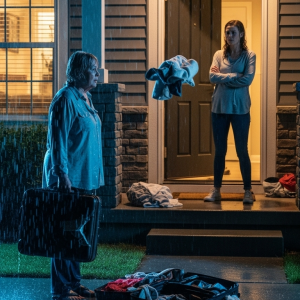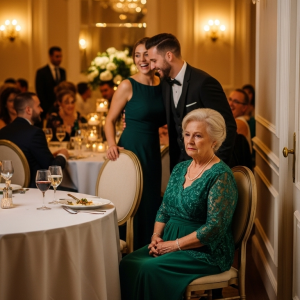My name is Mia, and I’m the oldest in a perfectly average, middle-class family. My parents, Anna and Robert, have run a small-town bakery for over twenty years. Growing up, it was no secret that my younger brother, Jake, was the golden boy. He could do no wrong in our parents’ eyes, and honestly, I didn’t mind. I preferred focusing on my own goals while he soaked up the spotlight. It never mattered to me. Until now.
Five years ago, my grandfather passed away. We were close, and in his will, he left me a trust fund. It wasn’t a lottery jackpot, but it was enough to change my life—if used wisely. The catch? I couldn’t access it until I turned thirty, and only for specific things like buying a house or starting a business. My plan was to let it sit until I was ready to launch my own graphic design firm, a dream I’d been nurturing for years.
Fast forward to this year. Jake got engaged to Emma. She comes from a well-off family and has that effortless, polished charm that everyone seems to adore. I liked her, too, at first. But then things started getting weird.
It began at a family dinner. Out of nowhere, Emma brought up my trust fund. “Wow, that’s so lucky,” she said with a dazzling smile after I mumbled something about my business plans. “You know, Jake and I could really use some help with the wedding, or maybe even a down payment on a house.”
Jake chuckled awkwardly. I laughed, assuming it was a joke. But she just kept staring at me, her smile fixed, waiting for me to agree. The silence was deafening. My parents quickly changed the subject, but the seed had been planted.
Over the next few weeks, Emma found a way to bring it up at every gathering. Her comments became more pointed, wrapped in sickeningly sweet concern. “It’s just so rare,” she’d sigh, “to see someone in a position to really help their family.”
Jake, initially quiet, started echoing her sentiments. “I mean, it’s not like you’re using the money right now, Mia. I get why she’s bringing it up.”
I tried talking to my parents, hoping they’d set some boundaries. Instead, my mom surprised me. “You know, Emma just wants to feel like part of the family. She’s not trying to be pushy.”
The final straw came when Emma cornered me at another dinner, her bubbly facade gone. “Mia, I really think you should reconsider,” she said, her voice low and firm. “Don’t you think it’s kind of selfish to hold on to that money when your own brother needs it?”
I was floored by her boldness. I calmly explained, again, that the money wasn’t available and that I had plans for it. She stared at me as if I’d slapped her. “I guess I misunderstood what kind of person you are,” she said, before turning on her heel and walking away. The battle lines had been drawn, and I was starting to feel like I was on the wrong side of my own family.
After Emma labeled me “selfish,” the family dynamic shifted. At gatherings, I was met with tight smiles and a chilly distance. Emma, however, only grew bolder. She started framing her request as an “investment in the family’s future,” a ludicrous suggestion that I was supposed to bankroll their lives in exchange for… what, exactly?
What hurt most was seeing my parents slowly succumb to her influence. When I told them about Emma’s increasingly aggressive tactics, my mom’s response was a punch to the gut. “You know, Jake has always had it a little harder than you financially,” she said.
Harder than me? We grew up in the same house. The only difference was that I had worked and saved while Jake had not. My dad was no better. “Sometimes keeping the peace is more important than being right, Mia.”
The final ambush came when Jake and Emma invited me to lunch. After some strained small talk, Emma leaned in. “Mia, we’ve been thinking. What if you gave us half of the trust fund? That way, you’d still have plenty left, and we could start our life without all this stress.”
Half. She actually said half. When I refused, her tone turned sharp, accusing me of hoarding money. Jake jumped in, “Emma’s not wrong, Mia. This could really change things for us.” It felt like they were ganging up on me.
A few days later, my parents called me over for a “family meeting.” I walked in to find Jake and Emma already there, looking smug. My dad started, “Mia, maybe it’s time to consider giving them a portion of the trust. It doesn’t have to be half, but something to show your support.”
I couldn’t believe it. My own parents were now officially part of the pressure campaign.
“I’ve worked hard to plan for my future,” I said, my voice shaking with frustration. “Why should I have to give it up just because you two decided to get married?”
Emma’s smile faded, replaced by an icy glare. “The real issue here, Mia, is that you’re not willing to put the family first. It’s really disappointing.”
I stood up, unable to take anymore. “This isn’t about family. This is about you wanting my money, and I’m done having this conversation.” As I walked out, my dad called after me, “We just want a solution that works for everyone!”
“You mean a solution that works for them,” I shot back. It was clear I was completely on my own.
The weeks that followed were a nightmare of guilt trips and sideways glances. The breaking point came when my cousin Laura, one of my few allies, called. She told me Emma was spreading rumors at family events, painting me as a selfish villain who prioritized money over her own brother.
“To make matters worse,” Laura added, her voice low, “she’s been asking relatives about your finances, trying to find out if there’s any way she could get access to the money.”
That was it. I booked an appointment with an estate lawyer. She was shocked by the story and assured me the trust was ironclad. She advised me to document everything—every text, every email, every conversation—as Emma’s behavior was bordering on harassment.
Meanwhile, Emma took her campaign online, posting vague but pointed statuses about “selfish relatives” and “family drama.” Then, she crossed a line I never thought possible. A coworker pulled me aside one day. “Hey, someone called HR pretending to be a family member. They wanted to know your salary and financial situation.”
Horrified, I called my lawyer. It was time to send a cease and desist letter. The letter was firm, professional, and outlined every inappropriate action, warning that any further harassment would result in legal action. I felt sick sending it, but Emma had left me no choice.
Within days, Jake called, furious. “What the hell, Mia? You sent a legal letter to my fiancée? Do you know how embarrassing this is?”
“She has been harassing me for weeks, Jake,” I said, my voice trembling. “She tried to dig into my work finances. She crossed every line.”
He accused me of overreacting. The call ended badly. My parents were equally furious. “You didn’t need to make this a legal matter,” my mom said. I reminded her that I had talked to them, multiple times, and they had done nothing. It didn’t matter. In their eyes, I was the one who had broken the family.
The cease and desist letter bought a few days of quiet. But my parents and Jake made sure the tension remained thick. Then, one evening, everything blew up.
Jake accidentally sent a series of texts, meant only for Emma, to a family group chat. The messages exposed everything.
The first text from Jake to Emma read: “I found the messages you sent to your friends about Mia and the trust fund. Are you serious? You’ve been bragging about ‘securing the bag’ this whole time?”
Then came the screenshots he’d attached. Messages Emma had sent to someone else, gloating about her strategy. One read: “Don’t worry, Robert and Anna will push Mia into giving me the money. She’s too soft to hold out forever.” Another mocked my “little business dreams,” stating that the money should have been split from the start.
Jake’s final text to Emma hit even harder: “I can’t believe you’ve been manipulating everyone, including me, just to get your hands on money that isn’t yours. This stops now.”
When these messages landed in the family chat, the silence was deafening. Seconds later, Jake realized his mistake: Oh no, this wasn’t supposed to go here.
But it was too late. The group chat exploded. My mom was the first to respond: Emma, what is this? Is this true? Emma scrambled to defend herself, claiming the texts were taken out of context, but the damage was done.
Later, Jake called me, his voice shaky. “Mia, I’m so sorry. I was going to confront her privately. I didn’t mean for you to find out like this.”
“Why didn’t you say something sooner, Jake?” I asked, my frustration boiling over. “You defended her for months.”
“I didn’t know how bad it was until I found those messages on her phone by accident,” he admitted, his voice cracking. “I let her manipulate me. I’m so sorry.”
The fallout was immediate. The relatives who had criticized me started to see Emma’s true colors. Her frantic attempts to spin new stories fell on deaf ears. The screenshots were too damning.
A few days later, Jake called again. His tone was resigned. “I’ve ended things with Emma,” he said. “I couldn’t stay with someone who would treat my family like that.”
I could hear the regret in his voice, but it didn’t erase the months of hurt. “I’m glad you’re seeing things clearly now, Jake,” I said. “But you need to figure out why you let her manipulate you in the first place.”
As for Emma, she didn’t go quietly. I heard she complained to anyone who would listen that this was all my fault. Her lavish wedding plans crumbled; the high-end venue was canceled, the dream dress returned. She had been counting on my money to fund her vision, and now, it was all unraveling. Eventually, she disappeared from social media and from our lives.
My parents, shaken, began reaching out. My dad admitted they had mishandled the situation. My mom, Emma’s biggest defender, finally apologized. “I’m sorry, Mia,” she said. “I should have believed you sooner.” It wasn’t perfect, but it was a start.
Recently, I decided to reclaim my life. I set firm boundaries with my family. Rebuilding trust will take time, but we’re moving in the right direction. This whole ordeal taught me the importance of standing up for myself and prioritizing my own happiness. For the first time in a long time, I feel at peace. My life is moving forward, and I’m ready to focus on the future I’ve built for myself.
The day their wedding was supposed to happen, the church stood empty. No cars in the lot, no soft music from the choir loft, no guests in pastel suits and floral dresses. Just silence and wind.
I hadn’t planned to go. But something pulled me there. Closure, maybe.
I stood across the street, hands deep in my coat pockets, watching as a delivery truck pulled away with giant white floral arrangements still in the back. A few confused relatives milled about outside, holding printed invitations and murmuring.
Then I saw her—Emma, standing alone on the church steps, makeup smeared, veil in her hand, shouting into a phone.
“…I don’t care what they said—this is still happening!” she barked, pacing furiously. “They’re lying! Jake will come back. He has to come back!”
But Jake wouldn’t. Because three days earlier, he’d moved out of their apartment, packed his things, and left a note:
“I don’t know who I became around you. But I don’t like that version of myself. This isn’t what love looks like.”
The moment I saw Emma throw her phone to the ground in frustration, a strange sense of peace came over me.
She had finally lost control.
Two weeks later, I was closing my laptop at the coffee shop when I looked up and saw her. Emma.
She slid into the seat across from me without asking. Her eyes were hollow. Her nails were chipped. The designer purse she once flaunted had been replaced with a worn tote.
“I lost everything,” she said flatly.
I said nothing. I wasn’t here to save her.
“Jake’s gone. Your family won’t return my calls. The wedding venue’s suing me for breach of contract. And guess what? My parents won’t help either.”
I raised an eyebrow. “So you came here to…?”
Her eyes narrowed. “To tell you I get it now. To say… maybe I went too far.”
“Maybe?” I said, letting the word hang in the air like smoke.
“You don’t understand what it’s like,” she hissed. “Growing up feeling like you always had to chase money just to feel worth something. You had a head start, Mia. I had to fight for every scrap.”
“You didn’t fight. You schemed. You turned people against me and tried to steal something that was never yours.”
Her lip trembled, but I held my ground.
“You know what the worst part is?” I said, leaning forward. “It wasn’t the lies. It wasn’t the manipulation. It’s that for a moment, I almost believed you. I almost thought I was the bad guy for protecting what was mine.”
Emma didn’t answer. She stood up, gathered her things, and before walking away, she said, “You’ll always be alone, Mia. You’re too cold to let anyone stay.”
I didn’t flinch. I just whispered, “Better alone than surrounded by leeches.”
Word of the fallout spread, of course. Small towns have a way of clinging to drama like vines on brick. But something surprising happened in the weeks that followed: people stopped whispering about me, and started whispering about her.
My aunts who once pushed me to “do the right thing” began to quietly apologize. A few even sent handwritten notes—clumsy, but genuine.
Jake, to his credit, stayed out of sight. I think he needed time to sit with his guilt. But one day, I found a small package on my doorstep. No note, just a USB stick.
I plugged it in.
It was a collection of videos—family birthdays, childhood vacations, even clips of my high school art show. All digitized. All moments my parents had long buried in a dusty VHS box. At the end was a single text file:
“You were never the background, Mia. I just didn’t know how much I depended on you until I saw what life looks like without you. I’m sorry. Jake.”
I cried that night. Not because of regret. But because someone had finally seen me.
Six months later, I launched my design firm—my dream finally realized.
No more guilt. No more apologies for protecting what was mine. The launch party was small, intimate. Just friends who stuck by me, and clients who saw my worth.
At one point, I glanced around the room. No Emma. No drama. Just laughter and light.
My parents sent flowers. A card signed, “Proud of you, love Mom and Dad.” I didn’t invite them, but I appreciated the gesture. Healing wasn’t a door you could kick open—it was a slow, deliberate walk.
Later that night, Jake showed up. He waited at the edge of the room until I nodded. We talked. Not about Emma. Not about the past. Just about the future.
“She made me feel powerful,” he admitted. “But only when I gave her control. You? You make people powerful just by standing beside them.”
I didn’t respond right away. I didn’t need to.
They used to call me selfish. Cold. Calculating. A villain in my own family.
But now?
They call me CEO. They call me independent. They call me brave.
What they don’t call me anymore… is weak.
Because the truth is, protecting your future isn’t selfish. It’s survival.
And maybe—just maybe—choosing yourself is the most radical kind of love there is.




